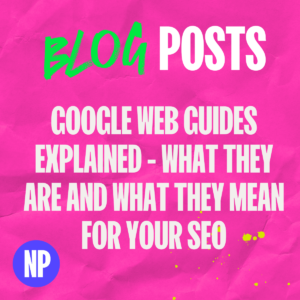“We’ve developed a revolutionary AI algorithm that Google doesn’t know about yet!”
Right, because clearly you’ve outsmarted the company that literally created the search engine you’re trying to game…

Another magic wand for sale
Ever since ChatGPT became a household name, every two-bit SEO agency that can’t sell backlinks anymore has suddenly discovered “proprietary AI technology” that’ll transform your search rankings overnight. They’re wanging on about “undetectable AI”, “revolutionary machine learning models”, and “AI systems that predict algorithm changes before they happen.”
It’s complete bollocks.
Look, it’s tempting, I know, but the thing about SEO is that there ARE are no shortcuts – no secret tools, no magic algorithms, no AI genies in a bottle. Sorry!
You can use as many AI tools as you like, but they’re unlikely to help your SEO in the way that these muppets claim.

Red flags that scream “run away”
They claim their AI has “reverse-engineered Google’s algorithm.”
If someone had actually cracked Google’s ranking system, they wouldn’t be cold-calling small businesses from a shared office in Bognor. They’d be running the internet.
Everything is “proprietary” and can’t be explained.
Real SEO tools have methodologies you can understand. If they can’t explain how their AI works without mentioning trade secrets, they’re hiding the fact that it doesn’t work at all.
They guarantee specific rankings or timeframes.
“Our AI-powered content optimisation guarantees first-page rankings in 30 days!” No legitimate SEO professional makes guarantees because we don’t control Google’s algorithm.
They use buzzwords instead of explanations.
When every sentence contains “neural networks,” “deep learning,” and “semantic analysis” but no actual details about what the tool does, that’s marketing fluff designed to confuse you.
They won’t show you the tool in action.
Legitimate software can be demonstrated. If they won’t give you a proper walkthrough or insist you need to sign a contract first, they’re hiding something.

What they’re really selling you
When agencies claim their AI tool is “proprietary,” they’re banking on you not asking too many awkward questions. Most of these “top secret” technologies are:
- Keyword research tools with AI branding slapped on top. The same keyword data that’s available to everyone, just presented with more buzzwords and higher prices.
- Content analysis that any decent SEO could do manually. Checking things such as keyword density, readability scores, and meta tag optimisation – all standard practice for decades.
- Rank tracking with predictive features. They’ll show you graphs predicting where your rankings might go, but prediction isn’t the same as influence. Weather apps predict rain, but they don’t control the weather.
- “AI-driven link building” that’s just spam email templates. Automated outreach to random websites isn’t revolutionary – it’s what got email marketing a bad reputation in the first place.

Questions that make them squirm
Want to separate the legitimate SEO experts from the AI spam merchants? Ask them these questions and watch them squirm:
- “Can you show me exactly how your AI tool works?” If they start mumbling about proprietary secrets and competitive advantages, that’s your answer right there.
- “What specific data sources does your AI use that others can’t access?” Hint: there aren’t any secret Google APIs that only certain agencies can use.
- “Can I see the average results across all your clients, not just the success stories?” Watch them suddenly become very interested in discussing your specific needs instead.
- “What happens if your AI predictions are wrong?” Real professionals have contingency plans. Fraudsters have excuses about “algorithm volatility.”

What really works for SEO
You know what gets results? The fundamentals. Quality content that helps real people solve real problems. Solid technical foundations that don’t make Google’s crawlers give up. Genuine authority built through consistently demonstrating expertise.
Not some over-hyped AI tool that probably does little more than regurgitate generic SEO advice you could find free online.
Next time an agency tries to dazzle you with their shiny AI toy, ask to see real results – not cherry-picked case studies, but average client performance. If they start mumbling about NDAs and proprietary secrets, run.
Save your money. Focus on creating genuinely helpful content, fixing technical issues, and building real authority in your industry. It’s less exciting than “revolutionary AI systems,” but it works.
There are so many SEO Myths out there that I wrote a book about them – SEO Myths Debunked.




